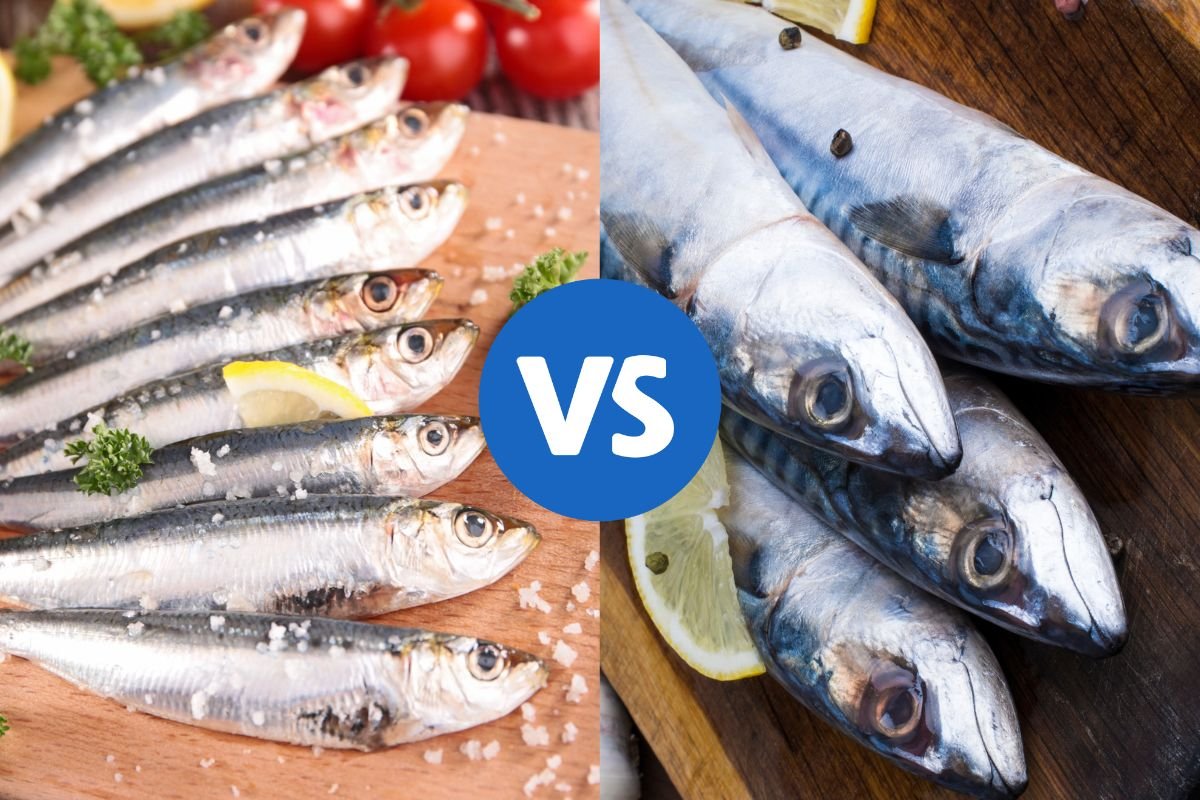Hey there! As someone who loves all types of seafood, I’d love to give you a quick rundown on mackerel and sardines. Both fish are incredibly delicious and nutritious, but they do have some differences worth noting.
I hope you packed some crackers to go with this delicious snack! Let’s look closer at what makes sardines an easy-to-prepare snack or meal, and what makes mackerel a great healthy alternative.
Sardines vs Mackerel
Mackerel is a larger fish with a firmer texture and a slightly stronger flavor compared to sardines. It’s a great source of omega-3 fatty acids, vitamin D, and selenium, making it a fantastic choice for maintaining heart health and brain function.
Sardines, on the other hand, are smaller and more delicate in texture. They have a milder flavor and are often packed in oil or water. Despite their small size, sardines are also a rich source of omega-3 fatty acids and other essential nutrients, making them a great choice for a quick and healthy snack.
Which is Better Mackerel or Sardines?
As someone who enjoys both mackerel and sardines, I believe that both fish are excellent choices depending on your preferences and needs. Mackerel has a stronger taste and firmer texture, while sardines are milder and more delicate. Both are packed with omega-3 fatty acids and other essential nutrients that can benefit your health in various ways.
Personally, I love grilling mackerel for a hearty and satisfying meal, while I enjoy snacking on sardines packed in oil for a quick and tasty snack. So, it really depends on what you’re in the mood for! At the end of the day, both mackerel and sardines are excellent options to add to your diet for their health benefits and delicious taste.
Do Mackerel and Sardines Taste the Same?
Mackerel and sardines are both popular types of fish that are packed with nutrients and enjoyed by many seafood lovers. While they share some similarities, such as being oily and rich in omega-3 fatty acids, they do have distinct taste differences.
Mackerel has a firmer texture and a stronger flavor, often described as rich, bold, and slightly salty. Sardines, on the other hand, have a milder taste and a softer texture. They are often described as slightly sweet, with a delicate flavor that is often enhanced by the oil or sauce they are packed in.
So, while both fish are delicious and nutritious, they do have their own unique taste profiles. If you’re a fan of seafood, it’s definitely worth trying both mackerel and sardines to see which one you prefer!

Mackerel vs Sardines Nutrition
In terms of nutrition, both sardines and mackerel are excellent sources of protein, healthy fats, and numerous vitamins and minerals. Mackerel tends to be higher in omega-3 fatty acids than sardines, which are essential for heart health, brain function, and reducing inflammation.
Sardines, on the other hand, are a great source of calcium and vitamin B12, important for bone health and energy production, respectively. Both fish are low in calories and high in protein, making them great options for those looking to maintain a healthy weight and support muscle growth.
| Nutrient | Sardines (3.75 oz/106g) | Mackerel (3.5 oz/100g) |
|---|---|---|
| Calories | 191 | 305 |
| Protein | 23g | 18g |
| Fat | 10g | 25g |
| Omega-3 Fatty Acids | 1.5g | 2.6g |
| Vitamin D | 64% of RDI | 250% of RDI |
| Calcium | 20% of RDI | 12% of RDI |
| Vitamin B12 | 163% of RDI | 317% of RDI |
| Selenium | 44% of RDI | 64% of RDI |
| Niacin | 30% of RDI | 27% of RDI |
| Phosphorus | 39% of RDI | 34% of RDI |
Benefits of Mackerel vs Sardines
Mackerel and sardines are incredibly healthy fish options that provide various benefits for your body. Although they share many advantages, they have some differences worth mentioning.
Mackerel is an excellent source of omega-3 fatty acids, which are essential for heart health, brain function, and reducing inflammation. It is also a rich source of vitamin D, a nutrient crucial for bone health and immunity. With its firmer texture and bolder taste, mackerel is a great choice for a hearty meal.
Sardines, on the other hand, have a milder taste and a softer texture. They are also rich in omega-3 fatty acids and contain high levels of calcium, which is crucial for strong bone development and maintenance. Sardines are also an excellent source of vitamin B12, an essential nutrient for maintaining nerve and blood cell health.
Both mackerel and sardines are low in mercury, making them a safer choice compared to larger fish such as tuna. They are also low in calories and high in protein, making them a great addition to a balanced diet.
Another fish combo to check out! Pollock vs Haddock
Does Mackerel Have More Omega 3 Than Sardines?
Mackerel and sardines are both excellent sources of omega-3 fatty acids, but mackerel does tend to contain more omega-3s than sardines. The specific amount of omega-3s can vary based on the type of mackerel or sardine, but in general, mackerel contains more of these beneficial fatty acids per serving.
Omega-3 fatty acids are essential for maintaining heart health, and brain function, and reducing inflammation in the body, and both mackerel and sardines are great options to consider for incorporating more of these healthy fats into your diet. However, if you are looking to maximize your omega-3 intake, mackerel may be the better choice between them.

Is All Mackerel High in Mercury?
Not all mackerel is high in mercury, but some types can contain higher levels than others. King mackerel, for example, is a type of mackerel that is known to contain high levels of mercury and is recommended to be limited or avoided by certain groups, such as pregnant women and young children.
Other types of mackerel, such as Atlantic mackerel and Spanish mackerel, are generally considered to be lower in mercury and can be safely consumed in moderation. It’s always a good idea to check with your local health authorities or consult with your healthcare provider if you have concerns about mercury levels in your diet.
If you love fish you can also check out Bluegill vs Perch
Are Canned Sardines Really Sardines?
Yes, canned sardines are typically made from real sardines. The term “sardines” usually refers to small, oily fish that belong to the herring family, and they are often sold canned in supermarkets and grocery stores.
Canned sardines are a convenient and affordable way to enjoy the benefits of this nutritious fish, and they can be a great addition to salads, sandwiches, pasta dishes, or eaten straight out of the can. It’s important to check the label to ensure that you are buying a product that is made from real sardines and not a substitute, as some canned products may use different types of fish or seafood.
Is Mackerel a Superfood?
Mackerel is often considered a superfood due to its high nutrient content and numerous health benefits. It is a rich source of omega-3 fatty acids, which are essential for heart health, brain function, and reducing inflammation. Mackerel is also a great source of vitamin D, a nutrient crucial for bone health and immunity.
In addition to its impressive nutrient profile, mackerel is low in calories and high in protein, making it a great addition to a balanced diet. It is important to note that like all foods, mackerel should be consumed in moderation as part of a varied and healthy diet, and individuals with certain health conditions or dietary restrictions should consult with their healthcare provider before adding mackerel to their diet.
Found this article interesting? Check out Salmon Vs Tilapia
Mackerel or Sardines: Final Thoughts
Both mackerel and sardines are incredibly nutritious fish options that can provide numerous health benefits when incorporated into a balanced diet. Mackerel tends to be higher in omega-3s than sardines, while sardines are a great source of calcium and vitamin B12.
However, personal taste preference is also an essential factor to consider when choosing between the two. Personally, I prefer the milder taste and softer texture of sardines, but I also enjoy the firmer texture and bolder taste of mackerel.
Ultimately, whether you prefer one over the other or enjoy both equally, incorporating these fish into your diet can be a great way to promote overall wellness and improve your quality of life.



